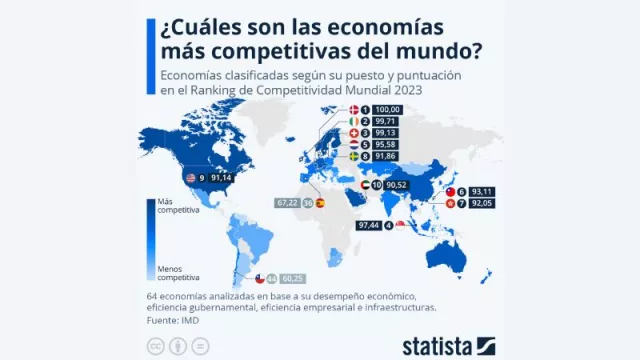Denmark maintained its top position from last year when it experienced a significant rise to the top. Ireland made a notable leap from 11th place to secure the second spot, while Switzerland remained in third place, after descending from the second spot in 2022 and the first spot in 2021.
The three countries are small economies that make the most of their access to markets and trading partners, much like Singapore, which ranked fourth.
Professor Arturo Bris, Director of the WCC, commented on the results: "An increasing number of countries are pursuing their own interests. We are seeing winners and losers in a context where multiple crises overlap, and the world is increasingly divided between protectionist and open trading economies."
By Statista.
The huge difference between Venezuela and capitalism:
Christos Cabolis, Chief Economist of the WCC, explained: "Navigating today's unpredictable environment requires agility and adaptability. Countries that excel are building resilient economies, like Ireland, Iceland, and Bahrain. Their governments are also capable of adapting policies based on current economic conditions in a timely manner. The United Arab Emirates, Saudi Arabia, Qatar, and Singapore are also key examples of this."
The top 3 in detail:
Denmark's leadership position is based on its continuous achievements in the four measured competitiveness factors. It remains in first place in business efficiency and second place in infrastructure, and shows slightly improved results in government efficiency, moving up to the fifth spot from the sixth.
Another factor measured in the ranking is economic performance. Ireland's rapid rise is largely due to its outstanding performance in this factor, where it jumped from seventh to first place.
Switzerland maintains its third place thanks to its strong performance in all measured competitiveness factors. It remains in first place in government efficiency and infrastructure, ranks seventh in business efficiency (a drop from fourth place), and improves in economic performance (up to 18th place from 30th).
Settling after the pandemic:
The 2023 results also highlight how economies that took longer to reopen after the COVID-19 pandemic are starting to see improvements in their competitiveness (e.g., Thailand, Indonesia, and Malaysia). Those that opened early are now experiencing declines (such as Sweden and Finland).
Europe stood out in the ranking, as it did in 2022, with five economies in the top 10. In addition to being smaller, the most competitive economies also tend to have strong and efficient institutions. "The ability to generate prosperity for its population is a determining factor in the success of a country. This is something that China has not yet achieved, nor has the United States as a whole," explained Bris.
In the top 10, Singapore dropped one position to fourth place, the Netherlands rose one spot to fifth (from sixth), Taiwan, China gained one position (up to sixth from seventh), and Hong Kong SAR fell to seventh (from fifth). The United States improved one spot to ninth, and the United Arab Emirates climbed two spots to occupy the tenth position.
The ranking is a valuable tool for evaluating highly contrasting business environments, supporting international investment decisions, and assessing the impact of various public policies. Clearly, nations with greater transparency in public administration and a capitalistic economy have experienced drastic development in competitiveness, which also impacts quality of life, GDP growth, and overall societal and business development.
It serves both managers and policymakers and is an indicator of the quality of life in each evaluated country. The ranking relies on the support of a network of 57 local Associated Institutes. It is based on a combination of objective data: 164 competitiveness criteria selected as a result of thorough research using economic literature, international, national, and regional sources, as well as feedback from the business community, government agencies, and academics. Additionally, 92 survey questions answered by 6,400 senior executives are included. Objective data accounts for two-thirds of the total ranking results, while survey data represents one-third.
Kuwait is the latest economy to join the ranking, making its debut in 2023.












Tu opinión enriquece este artículo: